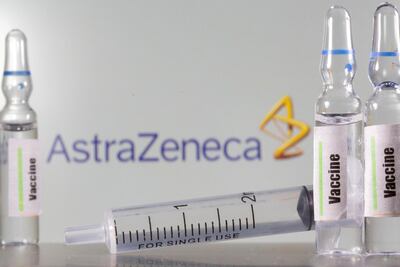The EU on Friday risked a global battle for vaccine supplies after unveiling a drastic plan to restrict the export of Covid-19 shots.
The plan to ensure Europe gets its “fair share” of coronavirus vaccines came on the same day the bloc’s medicines regulator approved the AstraZeneca/Oxford University shot for use in people aged 18 and older.
It brings the bloc’s total vaccine arsenal to three after the Moderna and Pfizer/BioNTech shots were previously approved.
The regulator's approval for the AstraZeneca vaccine came despite Germany's vaccine commission warning there was not enough data to support its efficacy in people aged over 65.
Johnson & Johnson also announced on Friday that clinical trials showed its coronavirus vaccine was moderately effective in preventing the disease with just a single shot.
J&J said that in the US and seven other countries, the single-shot vaccine was 66 per cent effective overall at preventing moderate to severe illness, and much more protective - 85 per cent - against the most serious symptoms.
In South Africa, where a Covid variant is circulating widely, J&J’s vaccine was only 57 per cent effective, versus a 72 per cent efficacy in the US where the mutation is less prevalent.
Novavax, another vaccine, was found to be 60 per cent effective against the South African strain.
Professor Paul Heath, Novavax's clinical trial chief investigator, was confident the vaccines could be modified to overcome the mutations.
"The UK variant can successfully be prevented with this vaccine. Yes, the South African is more difficult," he told the BBC.
"But I think all of the technologies we have seen mean we can adapt at pace, so we can keep up and get ahead of the virus."
While the J&J and Novavax shots are not as strong as their rivals, they are still potentially helpful for a world in dire need of more doses.
With the EU far behind the UK and US in the race to vaccinate its people against the coronavirus, the new export controls unveiled by the European Commission will oblige drug companies such as Pfizer and AstraZeneca Plc to obtain prior authorisation before sending shots manufactured in the bloc to other countries.
“The protections and safety of our citizens is a priority and the challenges we now face left us with no choice but to act,” EU Trade Commissioner Valdis Dombrovskis said.
“This is a race against the clock — we cannot lose time because of vaccines not being delivered on schedule.”
The step represents a dramatic escalation in the global battle for vaccines, with thousands dying every day and the European economy struggling under lockdown measures that have lasted almost a year.
But the move risks drawing accusations of protectionism as the EU tries to compensate for perceived missteps in negotiations with drug makers and the slow roll-out of national vaccination programs.
The new rules, which will run until the end of March, will allow EU states to block exports if a set of pre-defined criteria have not been met, however officials were eager to point out that the move stopped short of blanket bans.
The main condition will be that companies have already delivered a sufficient number of dosages to EU members, as set out in existing purchase agreements.
The curbs will affect vaccine production and filling facilities operated by AstraZeneca, Moderna and Pfizer in Belgium, the Netherlands, Spain, France and elsewhere.
The dispute was triggered by AstraZeneca’s decision to prioritize Britain over the EU in what the bloc claimed was a breach of terms. The company warned last week that deliveries of its doses to the EU this quarter would be less than half what was initially planned.
While the move raises questions about its legality, World Trade Organisation rules regarding export restrictions have exemptions in the event of critical shortages of essential products, or the need to protect human life and health.
EU chief Ursula von der Leyen continued to demand that AstraZeneca fulfill its contractual obligations for the vaccine.
The European Commission published its contract with the company, hoping to show a breach.














